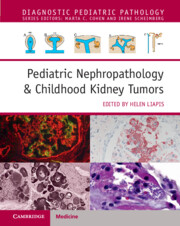Book contents
- Pediatric Nephropathology & Childhood Kidney Tumors
- Diagnostic Pediatric Pathology
- Pediatric Nephropathology & Childhood Kidney Tumors
- Copyright page
- Dedication
- Contents
- Contributors
- Preface
- Section 1 Normal and Abnormal Human Kidney Development
- Chapter 1 Normal Human Kidney Development and Congenital Anomalies of the Kidneys and Urinary Tract
- Chapter 2 Distribution of Pediatric Renal Biopsy Diagnoses in a Large Single Center and Rare Pediatric Cases
- Section 2 Glomerular Diseases
- Section 3 Tubulointerstitial Diseases
- Section 4 Vascular Diseases
- Section 5 Infectious Diseases
- Section 6 Cystic Diseases
- Section 7 Solid Tumors of the Kidney
- Section 8 Transplant Pathology of the Kidney
- Index
- References
Chapter 2 - Distribution of Pediatric Renal Biopsy Diagnoses in a Large Single Center and Rare Pediatric Cases
from Section 1 - Normal and Abnormal Human Kidney Development
Published online by Cambridge University Press: 10 August 2023
- Pediatric Nephropathology & Childhood Kidney Tumors
- Diagnostic Pediatric Pathology
- Pediatric Nephropathology & Childhood Kidney Tumors
- Copyright page
- Dedication
- Contents
- Contributors
- Preface
- Section 1 Normal and Abnormal Human Kidney Development
- Chapter 1 Normal Human Kidney Development and Congenital Anomalies of the Kidneys and Urinary Tract
- Chapter 2 Distribution of Pediatric Renal Biopsy Diagnoses in a Large Single Center and Rare Pediatric Cases
- Section 2 Glomerular Diseases
- Section 3 Tubulointerstitial Diseases
- Section 4 Vascular Diseases
- Section 5 Infectious Diseases
- Section 6 Cystic Diseases
- Section 7 Solid Tumors of the Kidney
- Section 8 Transplant Pathology of the Kidney
- Index
- References
Summary
The distribution of renal disease varies significantly between the adult and pediatric population. Furthermore, given the advances in the understanding of renal diseases, the manner in which diseases are categorized and diagnosed has evolved over time. To study an up-to-date distribution of pediatric renal diseases, a retrospective review of all biopsy reports from patients between birth and 18 years of age, diagnosed at a central reference laboratory over a 5-year period (2016–2020), was performed. A total of 3,606 pediatric biopsies were reviewed, representing 4.63% of all samples (total: 77,941). Biopsies from native kidneys equaled 2,880, while those from allografts totaled 726. In native kidneys, glomerular diseases represented the overwhelming majority of diagnoses (76.6%), followed by tubulointerstitial diseases (15.65), normal biopsies (8.09%), limited samples (2.92%), non-specific chronic changes (2.74%), vascular diseases (1.8%), monoclonal immunoglobulin-related disease (0.17%) and, lastly, malignant infiltrating diseases (0.1%). On the other hand, allograft biopsies predominantly showed rejection (49.31%), either T-cell-mediated, antibody-mediated or a combination of both, followed by negative for rejection (46.42%) and limited samples (4.27%). Biopsies categorized as negative for rejection included acute tubular injury (17.77%), infarcts (0.41%), recurrent diseases (4.27%), de novo diseases (6.34%), polyomavirus nephropathy (2.75%) and normal histology (14.88%).
Keywords
- Type
- Chapter
- Information
- Pediatric Nephropathology & Childhood Kidney Tumors , pp. 17 - 26Publisher: Cambridge University PressPrint publication year: 2023

